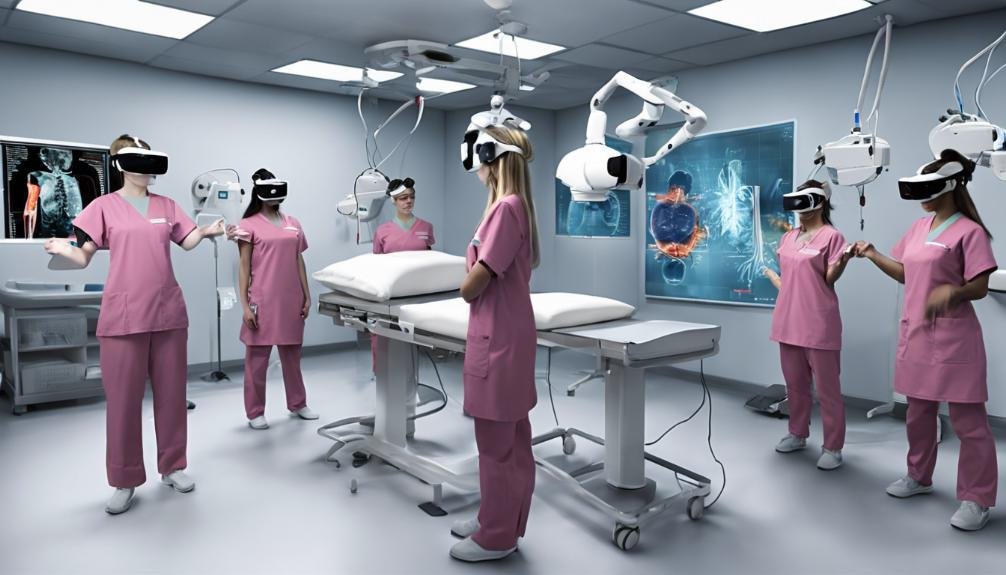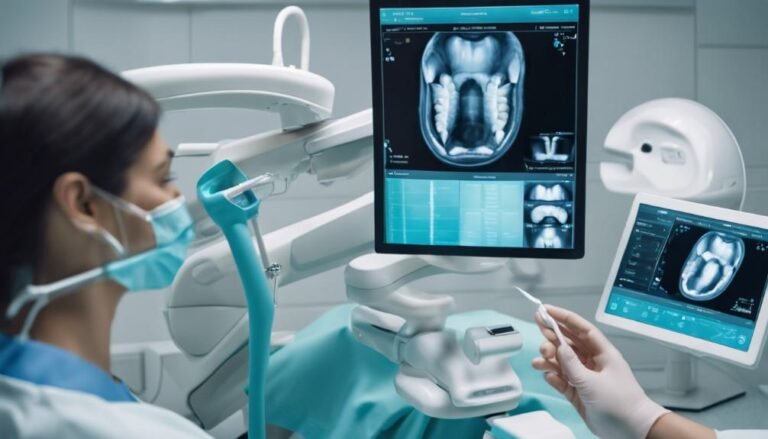AI in Nursing Education
As you explore the field of nursing education, the integration of AI brings forth a multitude of possibilities and advancements. Imagine a scenario where learning is tailored precisely to your needs, offering a personalized approach unlike any other. The impact of AI on nursing education goes beyond conventional methods, challenging traditional practices and ushering in a new era of innovation. In this evolving landscape, the fusion of technology and education reshapes the future of nursing students, preparing them for a dynamic healthcare environment.
Key Takeaways
- AI optimizes knowledge retention and skill development in nursing education.
- Personalized learning paths cater to individual student needs and paces.
- Automated grading systems offer efficient and objective feedback.
- AI tutors provide immediate feedback and tailored learning journeys.
- Virtual simulations enhance practical experiences and clinical skills development.
Enhancing Learning With AI
Enhance your learning experience in nursing education through the integration of AI technologies designed to optimize knowledge retention and skill development. AI tutors provide personalized learning experiences, guiding you through complex concepts at your own pace. These digital tutors offer immediate feedback, helping you identify areas for improvement and reinforcing your understanding of essential nursing principles.
Interactive simulations take your learning to the next level by immersing you in realistic patient care scenarios. Through these simulations, you can practice critical thinking, decision-making, and communication skills in a safe and controlled environment.
Virtual reality enhances skill development by allowing you to perform hands-on tasks without risk to actual patients. This technology replicates clinical settings, giving you the opportunity to develop and refine your nursing skills through repeated practice.
Personalized Education Solutions
As a nursing student, personalized education solutions can greatly enhance your learning experience. Customized learning paths tailored to your strengths and weaknesses can help you focus on areas that need improvement.
Adaptive assessment tools can provide real-time feedback to guide your progress effectively.
Customized Learning Paths
Tailoring learning paths to meet the unique needs and preferences of nursing students is a pivotal aspect of personalized education solutions in the field of AI in nursing education. By offering individualized curriculums and adaptive learning paths, AI systems can cater to the diverse learning styles and paces of each student.
Imagine an AI-powered platform that assesses your strengths and weaknesses, then crafts a customized learning journey just for you. This tailored approach not only enhances your understanding of complex nursing concepts but also boosts your confidence as you progress through the material at your own pace.
With individualized curriculums, AI can identify areas where you excel and topics that require more attention, ensuring that your learning experience is efficient and effective. Adaptive learning paths further enhance this by adjusting the difficulty level and content based on your performance, providing targeted support where needed.
Embracing customized learning paths through AI in nursing education empowers you to take control of your learning journey, making the educational process more engaging and impactful.
Adaptive Assessment Tools
Crafting a personalized learning journey in nursing education involves leveraging adaptive assessment tools that tailor evaluations to your unique strengths and areas needing improvement. These tools utilize adaptive learning algorithms to adjust the difficulty level of questions based on your performance, ensuring you're consistently challenged at the right level. By providing real-time feedback and identifying your specific learning needs, adaptive assessment tools enhance student engagement and promote active participation in the learning process.
Through personalized assessments, you can focus your time and energy on areas where you need the most improvement, maximizing the efficiency of your study sessions. Moreover, these tools help educators track your progress more effectively, enabling them to provide targeted support and guidance.
Streamlining Student Assessment
When it comes to streamlining student assessment in nursing education, automated grading systems can offer efficiency and consistency in evaluating student work.
Personalized learning plans tailored to individual student needs can enhance the educational experience, ensuring targeted support where it's most needed.
Real-time performance analytics enable educators to track progress effectively and make data-driven decisions to improve student outcomes.
Automated Grading Systems
Implementing automated grading systems in nursing education can greatly streamline the process of student assessment, providing efficient and objective feedback to enhance learning outcomes. These systems offer benefits such as increased grading accuracy and improved student engagement. By automating the grading process, instructors can save valuable time that can be redirected towards providing personalized support to students.
Automated grading systems help in maintaining consistency in grading criteria and feedback, ensuring that all students are evaluated fairly. The immediate feedback generated by these systems promotes student engagement by offering insights into their performance promptly. This real-time feedback loop motivates students to track their progress continuously and seek improvement.
Moreover, automated grading systems contribute to assessment improvement by enabling educators to identify trends in student performance and areas needing more focus. By analyzing data generated through these systems, instructors can tailor their teaching strategies to meet the specific needs of individual students, ultimately enhancing the overall learning experience in nursing education.
Personalized Learning Plans
Developing personalized learning plans in nursing education can revolutionize student assessment by tailoring educational strategies to meet the unique needs of each learner. By implementing individualized instruction and adaptive learning techniques, educators can create personalized curriculums that cater to the specific strengths and weaknesses of each student.
This customized training approach allows for a more targeted and effective learning experience, optimizing student success and comprehension.
Personalized learning plans enable educators to identify areas where students may be struggling and provide additional support or resources to help them overcome challenges. Through adaptive learning technologies, students can progress at their own pace, receiving feedback and guidance tailored to their individual learning styles.
This approach fosters a deeper understanding of the material and enhances critical thinking skills.
Real-Time Performance Analytics
To enhance student assessment in nursing education, real-time performance analytics can provide valuable insights into individual progress and streamline the evaluation process effectively. By leveraging data-driven insights, educators can gain a deeper understanding of student performance, enabling them to tailor interventions and support where needed. These analytics offer a window into students' strengths and areas for improvement, facilitating a more targeted approach to education.
Continuous improvement is at the core of utilizing real-time performance analytics in nursing education. With access to immediate feedback on training outcomes, educators can make timely adjustments to their teaching methods, ensuring that students are receiving the most relevant and beneficial instruction. This iterative process fosters a dynamic learning environment that adapts to the needs of each student, ultimately enhancing the overall educational experience.
Incorporating real-time performance analytics not only benefits students by providing personalized support but also empowers educators to make data-driven decisions that optimize learning outcomes. By embracing this technology, nursing education can evolve to meet the demands of a rapidly changing healthcare landscape, preparing students for success in their future careers.
Real-time Feedback and Support
Enhance your nursing education experience by receiving immediate feedback and support through real-time technology integration. Imagine the benefits of continuous assessment coupled with personalized guidance to help you excel in your studies.
With real-time feedback, you can instantly identify areas for improvement, allowing you to address them promptly. Interactive support systems provide you with the opportunity to engage actively in your learning process, making it more dynamic and tailored to your individual needs.
Through this innovative approach, you can receive guidance that's specific to your learning style and pace, enhancing your understanding and retention of vital nursing concepts. Whether it's clarifying complex medical procedures or reinforcing essential patient care skills, real-time feedback and support ensure that you're always on the right track.
Embrace this technological advancement as a valuable tool in your educational journey, empowering you to become a competent and confident nurse.
Simulation and Virtual Training
Engage in immersive simulation and virtual training experiences to enhance your nursing education journey through practical and interactive learning opportunities.
Virtual reality simulations and interactive learning environments offer hands-on training that provides immersive experiences, allowing you to develop essential skills in a safe and controlled setting. These simulations recreate realistic patient scenarios, enabling you to practice critical thinking, decision-making, and clinical skills.
Through virtual training, you can engage in scenarios that mimic real-life healthcare settings, allowing you to apply theoretical knowledge in a practical context. Interactive learning environments provide a platform for you to interact with lifelike patient avatars, medical equipment, and multidisciplinary teams. These experiences help you build confidence, improve communication skills, and enhance your ability to work effectively in high-pressure situations.
AI-Powered Clinical Skills Development
As you explore AI-powered clinical skills development, you'll encounter innovative tools like virtual patient simulations that offer realistic scenarios for practice. These simulations create personalized learning experiences tailored to your educational needs, allowing you to refine your nursing skills in a controlled environment.
Virtual Patient Simulations
Through the integration of virtual patient simulations, nursing students are provided with an immersive learning experience that enhances their clinical skills development through AI-powered technology. These interactive scenarios offer students the opportunity to engage in realistic virtual patient experiences that closely mimic real-world healthcare settings. By interacting with these virtual patients, students can practice evaluating symptoms, making diagnoses, and delivering care in a safe and controlled environment.
Virtual patient simulations enable students to apply theoretical knowledge to practical situations, helping them develop critical thinking skills and clinical reasoning abilities. The feedback provided by the AI technology allows students to learn from their mistakes and improve their decision-making processes. Additionally, these simulations offer a valuable supplement to traditional clinical training, allowing students to gain exposure to a wide range of patient cases and scenarios.
Personalized Learning Experiences
By tailoring learning experiences to individual student needs, AI-powered technology revolutionizes clinical skills development in nursing education. This personalized approach enhances student engagement through interactive learning experiences that cater to each learner's unique pace and style of acquiring skills.
Through AI algorithms, students receive personalized feedback tailored to their performance, allowing for targeted improvement in specific areas.
Moreover, AI enables individual progress tracking, giving students a clear overview of their strengths and areas that require further development. This real-time feedback mechanism fosters a sense of ownership over one's learning journey, motivating students to aim for continuous improvement.
By offering a customized learning path based on each student's proficiency level, AI ensures that learners are challenged appropriately while still feeling supported throughout the skill-building process.
Incorporating AI into clinical skills development not only optimizes learning outcomes but also empowers students to take an active role in their education, ultimately shaping more competent and confident nursing professionals.
Addressing Learning Needs Efficiently
To efficiently address learning needs in nursing education, utilizing AI technology can provide personalized and adaptive learning experiences for students. By incorporating efficient study techniques and adaptability in the curriculum, AI can tailor educational content to match individual learning styles and pace.
Technology integration allows for real-time feedback and assessment, guiding students to focus on areas where they need improvement, promoting competency-based learning.
AI algorithms can analyze student performance data to identify strengths and weaknesses, offering targeted resources and practice exercises to enhance understanding. This personalized approach not only optimizes the learning process but also fosters student engagement and motivation.
Through AI-driven platforms, educators can track student progress more effectively and intervene when necessary, ensuring that each learner receives the support they need to succeed.
Bridging Theory and Practice
In connecting theoretical knowledge with practical application, nursing educators can leverage AI technology to create dynamic learning experiences that enhance students' ability to translate concepts into real-world scenarios. By integrating practical application with theoretical knowledge, AI can provide hands-on experience in a virtual setting, allowing students to practice critical thinking and decision-making skills in simulated patient care situations.
This educational integration bridges the gap between theory and practice, preparing nursing students for the complexities of the healthcare environment.
AI-based simulations offer a safe environment for students to apply their theoretical knowledge, receive immediate feedback, and refine their clinical reasoning abilities. Through interactive scenarios, students can develop confidence in their skills and enhance their problem-solving capabilities.
These virtual experiences not only supplement traditional learning methods but also cater to different learning styles, promoting active engagement and deep understanding of nursing concepts.
Embracing AI technology in nursing education empowers students to acquire essential competencies and effectively transfer their knowledge into real-life patient care scenarios, ultimately fostering competent and confident nursing professionals.
Improving Student Engagement
Enhancing student engagement in nursing education involves implementing interactive AI tools that foster active participation and deep understanding of complex concepts. Student motivation is essential in maintaining interest and enthusiasm for learning. By integrating technology into the educational process, students can engage in interactive learning experiences that simulate real-world scenarios, making the material more relatable and easier to grasp.
Interactive learning activities, such as virtual patient simulations and online case studies, encourage active participation by allowing students to apply theoretical knowledge in practical situations. These tools not only enhance critical thinking and decision-making skills but also promote collaboration and communication among peers.
Through technology integration, students have the opportunity to explore various learning resources at their own pace, catering to individual learning styles and preferences. This personalized approach can greatly boost student engagement and overall academic performance.
Future Trends in Nursing Education
Implementing AI-driven learning platforms will revolutionize the landscape of nursing education in the coming years, reshaping how students acquire and apply essential knowledge and skills. Technology integration will play a pivotal role in enhancing the nursing curriculum design to meet the evolving demands of the healthcare industry. By incorporating AI tools, educators can personalize learning experiences, track student progress, and provide targeted interventions to support individual learning needs effectively.
The future workforce in nursing will be shaped by this digital transformation, where graduates will be equipped with advanced technological skills alongside clinical expertise. As AI continues to advance, nursing education will likely see a shift towards more interactive and simulation-based learning experiences, preparing students for real-world challenges in a safe and controlled environment.
Conclusion
To sum up, AI in nursing education offers a transformative approach to learning that benefits both students and educators.
Imagine a nursing student using a virtual simulation to practice a complex procedure, receiving instant feedback on their performance, and adjusting their approach in real-time.
This personalized and immersive learning experience not only enhances skills but also prepares students for the dynamic challenges of healthcare.
Embrace the future of nursing education with AI and discover new possibilities for success.







